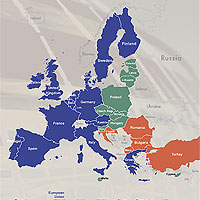Chance for Rapprochement Seen Ahead of Russia-EU Summit

(Moscow Times – themoscowtimes.com – Ivan Nechepurenko – June 3, 2013) Ahead of a Russia-EU summit set for Monday and Tuesday in Yekaterinburg, Russia’s permanent representative to the EU said the ongoing financial crunch had provided a unique chance for the two sides to grow closer.
“There are many factors that make Russia and the EU complement each other. Russia has a huge market that now also includes Belarus and Kazakhstan, while the EU has technological innovation that we need. Given these circumstances, I see a unique historical chance for our cooperation to move to a new level,” Vladimir Chizhov said at a video press conference from Brussels.
Listen
Russia is the only country that enjoys bilateral summits with EU leaders twice a year. The upcoming 31st one will be attended by European Council President Herman Van Rompuy, President of the European Commission Jose Manuel Barroso and the EU’s foreign affairs chief, Catherine Ashton.
The EU delegation will spend two days in talks with President Vladimir Putin.
Topics on the agenda include a mix of bilateral and international issues such as visas and mobility, human rights and freedom, a new EU-Russia agreement and developments in Syria and North Korea.
Russia and the EU share a mutually dependent relationship, with Russia being the EU’s third most important trading partner, after the U.S. and China, and the EU accounting for roughly half of Russian exports last year.
The sides are close to signing a new visa facilitation agreement that would see new categories of Russian citizens, including journalists and civil society representatives, enjoy long-term multiple-entry travel to EU countries, though according to Chizhov, it is unlikely that it will be signed at the summit.
“Our partners still have to come to a consensus with regard to the service passports issue,” Chizhov said.
While service passports are issued to government officials in case they need to travel abroad on a business trip, many observers say the issuance of such documents could be subject to corruption in Russia.
Russia is also negotiating visa-free short-term travel for Russians going to the EU and vice versa.
Chizhov was more positive on this development: “I believe we can conclude all necessary negotiations on the common steps by the end of this year and then start negotiating the actual visa waiver agreement,” he said.
Russia and the EU have developed a list of necessary steps to pave the way to introducing a visa-free regime. According to Chizhov, the sides have already fulfilled requirements for security, illegal migration and public order, and only one category, “external relations,” which includes human rights provisions, remains left to be negotiated.
On May 17, Russia and the EU held human rights consultations, during which the EU called on Russia to refrain from adopting federal legislation on “homosexual propaganda” and raised concerns over a recent wave of NGO inspections, conducted on the basis of the “foreign agents” law.
Chizhov expressed hope that the human rights issue would not come up for discussion at the summit, however, in order to avoid “making the atmosphere toxic.”
The ongoing crisis in Syria will be one of the main international issues discussed, with Russia recently lambasting the EU’s repeal of the Syria arms embargo. The decision prompted Moscow to fulfill arms delivery contracts with Damascus that were signed years ago.
Russia is thus planning to deliver more than 10 MiG fighter planes to the Syrian government of Bashar Assad, the head of state-owned MiG said Friday. The contract was signed in 2007.
At the same time, however, a source in Russia’s defense ministry told Kommersant that Syria would not receive the first shipment of the S-300 anti-aircraft missile system until at least the middle of next year.
